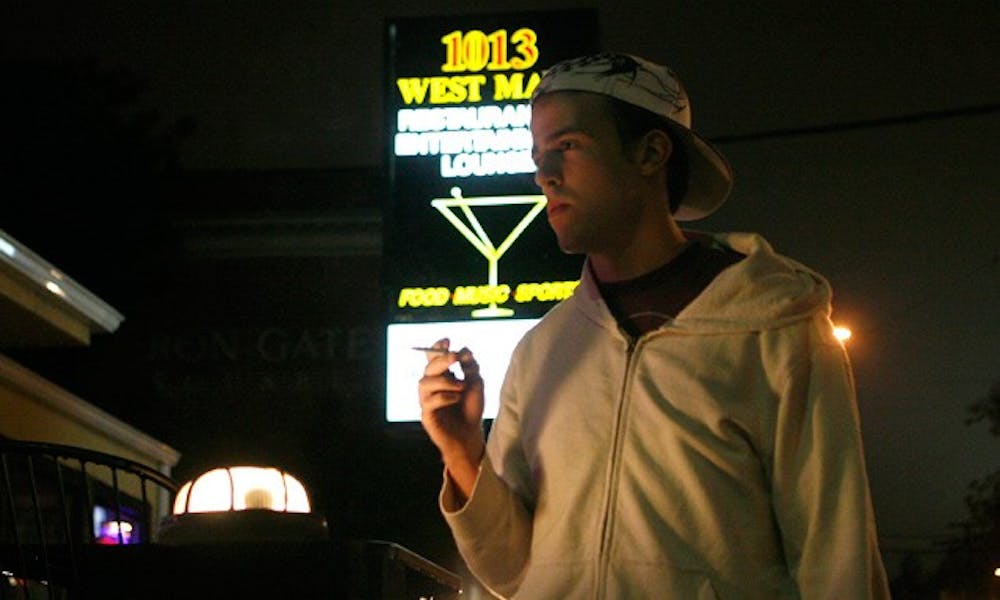The North Carolina smoking ban extinguished cigarettes in bars and restaurants, but it has also ignited some strong emotions.
The ban, which took effect Jan. 2, prohibits smoking in businesses that serve food and alcohol to protect the health of employees. Since its passage, the ban has stirred discontent among hookah bar owners in particular, which unlike cigar bars, tobacco shops and private clubs, are not exempt from the law.
“This law is a joke,” said Adam Bliss, owner of Hookah Bliss on Franklin Street in Chapel Hill. “I’m not sure what makes us different from a private club or cigar bars that got the exemptions, except for that fact that legislators don’t smoke hookah. It’s clear who is getting their places saved and who isn’t.”
Gehad Lobbad, owner of International Delights on Ninth Street, said his business has seen a small impact, though many customers who would have smoked in the restaurant buy tobacco anyway. Lobbad said he never received official correspondence about the ban, and says he is afraid to let people smoke near his restaurant—even he has smoked in his car.
But Bliss is not afraid of legal retribution. Since the beginning of the year, Bliss has defied the law and continued to operate as usual. Business owners are allotted two warnings before they receive citations with fines of $200. Bliss said he has received a warning from the county health director already and has hired lawyers to fight legislation.
Bars and restaurants near Duke are complying with the ban, but several owners said they have seen their business suffer. George Kastanias, owner of Taverna Nikos, never allowed smoking indoors. Kastanias echoed the sentiments of many in the area that the law is good for health, if not always for business.
“I think it is a little bit tough, not for restaurants, but for bars,” Kastanias said. “I’m a smoker myself and I want to have a drink and have a smoke, but now I have to go outside in the freezing cold to do that. I really don’t appreciate it, but it is good for my health. Personally, I’d like to quit one day, and I think it is an encouraging law.”
Hookah Bliss’s gross income is down 25 to 30 percent since the ban was instated. Bliss said that many people do not realize that he’s still open for business, some assuming that the hookah bar closed when the law went into effect.
“If I didn’t serve beer, I’d be considered a tobacco shop,” Bliss said. “Well sure, if they decide that I don’t have a valid case and I have to get rid of the alcohol, that’s 20 to 25 percent of my sales. I’m not sure my business will survive. I’m worried about my employees and about me being able to pay my bills and losing my house.”
Although Bliss is attacking the ban head-on, others hookah bars, like Juggling Gypsy in Wilmington, N.C., have gotten creative.
Juggling Gypsy’s owner found a loophole in the law that allows smoking on a live production set, said Denny Best, the bar manager of Juggling Gypsy. The bar has set up a camera inside the establishment and streams a live broadcast on its Web site.
“We are a live Internet broadcast reality show,” Best said. “We make customers sign a video release when they come in, and so everyone who comes in here is in fact an actor.”
New Hanover County officials, however, do not agree with what Best calls a “black and white” exemption.
The county health department sent Juggling Gypsy a letter seeking information about it’s practices. Kemp Berpeau, the deputy county attorney for New Hanover County, said Juggling Gypsy responded detailing what it thought was its exemption, and the county sent the bar a follow-up letter explaining that Juggling Gypsy is not exempt.
“They have a restaurant license, and they also have authorization from ABC to serve alcohol, so because they have those two licenses they are subject to the smoking ban,” Berpeau said. “I’m surprised that they still think [they are exempt] because we met with them last week.”
Under a local government section of the law, the ban does stipulate that smoking is not restricted on live production sets, but Berpeau explained that the section does not override the state law. Berpeau said the county told Juggling Gypsy that it would have to give up its restaurant and liquor license or become a nonprofit theater to comply with the law.
Still, many local bars see benefits to ban.
Some bars like Dain’s Place, next door to Charlie’s Neighborhood Bar on Ninth Street, built its clientele on its smoke-free environment. But bars like Charlie’s, which had allowed smoking before, were fearful about how the ban would affect their business. Oz, a bartender at Charlie’s, said many customers complained about the ban before it went into affect, but he noted that the bar has not lost any patrons.
Larry Johnson, a Pensacola, Fla. City Council member who was visiting the area and stopped in Charlie’s, said the years-long smoking ban in Florida has actually improved business.
“It was a welcome change,” Johnson said. “It is enjoyable to be in a smoke-free restaurant.”
Oz said the change makes for a more enjoyable work environment as well.
“I’m a smoker myself, but there is a difference between me smoking one cigarette and having to walk through a wall of smoke every day while I’m at work,” Oz said.
Get The Chronicle straight to your inbox
Signup for our weekly newsletter. Cancel at any time.

